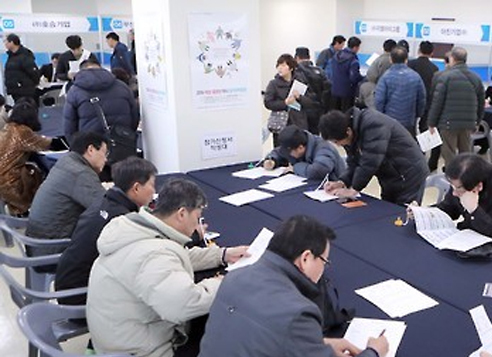Work hour reduction needs to be applied differently among industries
By KH디지털2Published : March 23, 2017 - 15:51
South Korean lawmakers need to differentiate between industries while introducing a law to reduce work hours for South Korean workers, a private research institute said Thursday.
South Koreans worked an average 2,113 hours annually compared to 1,766 hours on average for all member state of the Organization for Economic Cooperation and Development, a 2015 OECD data shows.

People in the country put in some of the longest work hours in the world.
The labor law limits work hours to 52 hours a week, but employees actually can work up to 68 hours a week, if they must show up at their jobs on Saturdays and Sundays.
Opposition parties, which control a majority of seats at the National Assembly, are preparing a bill that includes extended work hours on Saturday and Sunday into the weekly ceiling to effectively restrict the maximum work hours to 52.
The real estate, lodging, restaurants and several other industries will suffer the most with the application of the proposed bill across the board, the Korea Economic Research Institute said in a report.
The think tank said a strict 52-hour workweek can be applied to the education, finance, insurance and utility industries without creating any additional work hours.
The report said, that because some sectors will be affected more, lawmakers need to take into consideration specific characteristics of different industries.
It rebuffed the assumption that any reduction in work hours will automatically lead to an increase in employment.
"The labor market in our country is so rigid that any cuts in work hours will only result a decrease in production rather than additional employment," the report said. "In the long term, simple manual laborers might be replaced by machines." (Yonhap)








![[Graphic News] More Koreans say they plan long-distance trips this year](http://res.heraldm.com/phpwas/restmb_idxmake.php?idx=644&simg=/content/image/2024/04/17/20240417050828_0.gif&u=)
![[KH Explains] Hyundai's full hybrid edge to pay off amid slow transition to pure EVs](http://res.heraldm.com/phpwas/restmb_idxmake.php?idx=644&simg=/content/image/2024/04/18/20240418050645_0.jpg&u=20240419100350)





![[From the Scene] Monks, Buddhists hail return of remains of Buddhas](http://res.heraldm.com/phpwas/restmb_idxmake.php?idx=652&simg=/content/image/2024/04/19/20240419050617_0.jpg&u=20240419175937)

![[KH Explains] Hyundai's full hybrid edge to pay off amid slow transition to pure EVs](http://res.heraldm.com/phpwas/restmb_idxmake.php?idx=652&simg=/content/image/2024/04/18/20240418050645_0.jpg&u=20240419100350)

![[Today’s K-pop] Illit drops debut single remix](http://res.heraldm.com/phpwas/restmb_idxmake.php?idx=642&simg=/content/image/2024/04/19/20240419050612_0.jpg&u=)